_________________________________________________
Pollitecon Update
December 2024
________________________________________________
Sign
up to receive Updates
Many new books and some articles have been added to the Pollitecon
Free Ebooks Library and the website.
My Journey – Three Childhoods
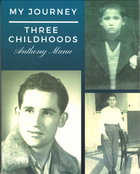 In
his autobiography, My Journey – Three Childhoods, Anthony Manu starts
his story in his village of Rula in the Macedonian province of northern
Greece where he grew up with war and soldiers – the Italians and Germans
in World War 2 and then the Greek Civil War. The author says he played
with bombs and guns and as there was no school he had little education.
But as a Macedonian child refugee in Romania he went to school, made
new friends and became a radio technician. At age 18 he came to Australia
and met his father for the first time. Manu went on to become an innovative
and entrepreneurial inventor of engineering products and a successful
businessman able to solve many product problems for a range of corporate
clients. This is a positive story of overcoming adversity and achieving
both professional and personal success in life. The book is Here.
In
his autobiography, My Journey – Three Childhoods, Anthony Manu starts
his story in his village of Rula in the Macedonian province of northern
Greece where he grew up with war and soldiers – the Italians and Germans
in World War 2 and then the Greek Civil War. The author says he played
with bombs and guns and as there was no school he had little education.
But as a Macedonian child refugee in Romania he went to school, made
new friends and became a radio technician. At age 18 he came to Australia
and met his father for the first time. Manu went on to become an innovative
and entrepreneurial inventor of engineering products and a successful
businessman able to solve many product problems for a range of corporate
clients. This is a positive story of overcoming adversity and achieving
both professional and personal success in life. The book is Here.
Among the Partisans of Marcos
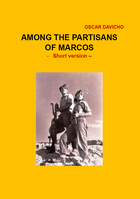 Among
the Partisans of Marcos by journalist Oskar Davicho is based on his
1947 conversations with General Marcos, one of the leaders of the Communist
Party of Greece and leader of the Democratic Army of Greece during the
Greek Civil War. A 1947 United Nations Security Council Inquiry Commission
into the situation in Aegean Macedonia included Davicho, who represented
Yugoslavia and that year published a book based on his observations.
The short version of the book is a selection of the most notable and
compelling excerpts of the book and the meeting with Marcos, says the
editor and translator, Aleksandar Donski. Marcos acknowledged the suffering
and discrimination against the Macedonians that " was practised by all
Greek governments without exception." The book is Here.
Among
the Partisans of Marcos by journalist Oskar Davicho is based on his
1947 conversations with General Marcos, one of the leaders of the Communist
Party of Greece and leader of the Democratic Army of Greece during the
Greek Civil War. A 1947 United Nations Security Council Inquiry Commission
into the situation in Aegean Macedonia included Davicho, who represented
Yugoslavia and that year published a book based on his observations.
The short version of the book is a selection of the most notable and
compelling excerpts of the book and the meeting with Marcos, says the
editor and translator, Aleksandar Donski. Marcos acknowledged the suffering
and discrimination against the Macedonians that " was practised by all
Greek governments without exception." The book is Here.
The Macedonian version, Megju Partizanite na Markos, is Here.
The Greek version is Here.
The White Terror in Southeastern Macedonia 1912-41
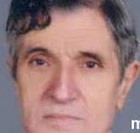 Beliot
Teror vo Jugoistochna Makedonija 1912-1941 (The White Terror in Southeastern
Macedonia 1912-41) by Dimitar Galev is a detailed study of the many
massacres, pillages, murders, rapes, denationalizations, colonizations
and other acts of terror in the south eastern part of the Republic of
Macedonia between 1912 and 1941. Book One focuses on the Balkan Wars
and the period between 1910 to 1915 when these acts were done by the
Ottoman, Greek, Bulgarian and Serbian armies and administrations. The
author provides a significant amount of detailed information and presents
this by geography across a large number of cities, towns and villages.
For each location it gives the names of those known to have been victims
or present, and in total the book has an enormous number of names. Beliot
Teror vo Jugoistochna Makedonija 1912-1941, Kniga Prva is Here.
Beliot
Teror vo Jugoistochna Makedonija 1912-1941 (The White Terror in Southeastern
Macedonia 1912-41) by Dimitar Galev is a detailed study of the many
massacres, pillages, murders, rapes, denationalizations, colonizations
and other acts of terror in the south eastern part of the Republic of
Macedonia between 1912 and 1941. Book One focuses on the Balkan Wars
and the period between 1910 to 1915 when these acts were done by the
Ottoman, Greek, Bulgarian and Serbian armies and administrations. The
author provides a significant amount of detailed information and presents
this by geography across a large number of cities, towns and villages.
For each location it gives the names of those known to have been victims
or present, and in total the book has an enormous number of names. Beliot
Teror vo Jugoistochna Makedonija 1912-1941, Kniga Prva is Here.
The Diary of the Macedonian Martyr Dragan Bogdanovski
 Dragan
Bogdanovski was a political activist, publisher and a founder of the
modern VMRO-DPMNE political party, which he based on the ideals of the
original VMRO for Macedonian independence and unity. Over many years
he was persecuted by Yugoslav politicians and lived in exile. He was
kidnapped by the secret police, imprisoned from 1977 to 1988, and was
an Amnesty International prisoner of conscience. After his release he
co-founded VMRO-DPMNE and was elected its honorary chairman. Dnevnikot
na Makedonskiot Machenik Dragan Bogdanovski (The Diary of the Macedonian
Martyr Dragan Bogdanovski) is mostly about his kidnapping, time in prison
and torture. The book was published by the VMRO Overseas Committees
of Perth and Adelaide, Australia. The book is Here.
Dragan
Bogdanovski was a political activist, publisher and a founder of the
modern VMRO-DPMNE political party, which he based on the ideals of the
original VMRO for Macedonian independence and unity. Over many years
he was persecuted by Yugoslav politicians and lived in exile. He was
kidnapped by the secret police, imprisoned from 1977 to 1988, and was
an Amnesty International prisoner of conscience. After his release he
co-founded VMRO-DPMNE and was elected its honorary chairman. Dnevnikot
na Makedonskiot Machenik Dragan Bogdanovski (The Diary of the Macedonian
Martyr Dragan Bogdanovski) is mostly about his kidnapping, time in prison
and torture. The book was published by the VMRO Overseas Committees
of Perth and Adelaide, Australia. The book is Here.
The Story of Child Refugee Vasil Vlashev Now in English
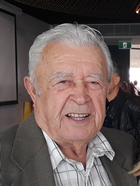 The
SBS Radio interview with child refugee from the Greek Civil War Vasil
Vlashev of Sydney has been translated into English. Vasil was from the
village of Breznitsa. He gives a detailed account of his family's life
in the village, how the children were organized and left their families,
his journey out of Greece, his new life in Romania, and how he came
to Australia. The English translation is Here.
The
SBS Radio interview with child refugee from the Greek Civil War Vasil
Vlashev of Sydney has been translated into English. Vasil was from the
village of Breznitsa. He gives a detailed account of his family's life
in the village, how the children were organized and left their families,
his journey out of Greece, his new life in Romania, and how he came
to Australia. The English translation is Here.
The Symbolism of the Prespa Agreement (Prespa Pain)
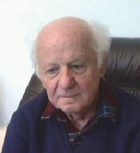 The
excellent article, The Symbolism of the Prespa Agreement (Prespa Pain)
by Petre Nakovski, draws many and unexpected links between the much-maligned
Prespa Agreement between Greece and Macedonia and the Greek Civil War
that saw so many Macedonian deaths. Here is one. During the War the
Prespa region was the headquarters of the defeated Democratic Army of
Greece. The author asks why was the Prespa Agreement signed at the village
of Nivitsi where 75 years earlier the Americans and Greeks bombed Nivitsi.
The author asks when "state agreements are signed in solemnly decorated
halls", why was it signed "in an almost deserted hilly lakeside village
which about seventy years ago was covered with Macedonian and Greek
blood, shed in the name of freedom... was it a reminder by the Athenians
that right here in Prespa, they wiped out many of our compatriots, and
those who managed to save themselves from the napalm bombs were driven
beyond the border without any right of return, and with this agreement
you are giving up on our dead and our banished living?" The author gives
many more political and historical insights in this beautifully written
article translated from the Macedonian by Elizabeth Kolupacev Stewart.
The English version is Here.
The Macedonian version is Here.
The
excellent article, The Symbolism of the Prespa Agreement (Prespa Pain)
by Petre Nakovski, draws many and unexpected links between the much-maligned
Prespa Agreement between Greece and Macedonia and the Greek Civil War
that saw so many Macedonian deaths. Here is one. During the War the
Prespa region was the headquarters of the defeated Democratic Army of
Greece. The author asks why was the Prespa Agreement signed at the village
of Nivitsi where 75 years earlier the Americans and Greeks bombed Nivitsi.
The author asks when "state agreements are signed in solemnly decorated
halls", why was it signed "in an almost deserted hilly lakeside village
which about seventy years ago was covered with Macedonian and Greek
blood, shed in the name of freedom... was it a reminder by the Athenians
that right here in Prespa, they wiped out many of our compatriots, and
those who managed to save themselves from the napalm bombs were driven
beyond the border without any right of return, and with this agreement
you are giving up on our dead and our banished living?" The author gives
many more political and historical insights in this beautifully written
article translated from the Macedonian by Elizabeth Kolupacev Stewart.
The English version is Here.
The Macedonian version is Here.
The Greek State's Approach for the Extinction of the Macedonian
People's Identity and Culture
The article, The Greek State's Approach for the Extinction of the Macedonian
People's Identity and Culture is a summary of the methods used by Greek
governments over the last century and more to oppress and negate the
indigenous Macedonians of northern Greece. The author, George Nitsou
(Goche Nichov), looks at the Political Approach, the Identity Approach,
the Economic Approach, the Linguistic Approach, the Ideological Approach,
and Queen Frederica's Schools – all of which were used, and most are
still used, to deny Macedonians their freedoms and human rights and
extinguish their identity and culture. The article is Here.
Four questions for those who still believe in pre historic Slavs
and other fairytales
 Renowned
archaeologist Florin Curta is a major critic of the theory of Slav-migration
into the western Balkans, saying there is no archeological evidence
to support it. He further challenges the theory in his paper: Four questions
for those who still believe in pre historic Slavs and other fairytales.
The four questions are: 1. If the Slavic ethnicity is about language,
how can people speak Slavic without being Slavs? 2. If the Urheimat
(location where speakers of a proto-language may have lived) of the
Slavs, at the time when they were a still undifferentiated ethnic group,
was in the region of Eastern Europe with river names of the most archaic
Slavic origin, why are there separate archaeological cultures in that
region? 3. Why is there no archaeological evidence of a Slavic migration
to the western Balkans? 4. If the early Slavs in the northwestern Balkans
had specific forms of social organization (e.g. the zupa), why is there
no evidence of that in the Urheimat in Eastern Europe, either before
or after the presumed migration? The paper is Here.
Renowned
archaeologist Florin Curta is a major critic of the theory of Slav-migration
into the western Balkans, saying there is no archeological evidence
to support it. He further challenges the theory in his paper: Four questions
for those who still believe in pre historic Slavs and other fairytales.
The four questions are: 1. If the Slavic ethnicity is about language,
how can people speak Slavic without being Slavs? 2. If the Urheimat
(location where speakers of a proto-language may have lived) of the
Slavs, at the time when they were a still undifferentiated ethnic group,
was in the region of Eastern Europe with river names of the most archaic
Slavic origin, why are there separate archaeological cultures in that
region? 3. Why is there no archaeological evidence of a Slavic migration
to the western Balkans? 4. If the early Slavs in the northwestern Balkans
had specific forms of social organization (e.g. the zupa), why is there
no evidence of that in the Urheimat in Eastern Europe, either before
or after the presumed migration? The paper is Here.
Makedonska Vistina
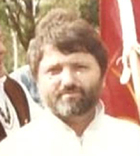 The
book Makedonska Vistina Stihozbirka (Macedonian Truth Poetry Collection)
is the collected poetry of political activist and poet Mitre Mojsovski.
This is a short book of only 30 poems but the author's political commitment,
political insight, and passion for the good of the Macedonian people
is clear and strong. The paper edition of Macedonian Truth was printed
in 1984 and this electronic version is now available. Both the printed
and electronic versions were edited and prepared by long time activist
Angele Vretoski. The book is Here.
The
book Makedonska Vistina Stihozbirka (Macedonian Truth Poetry Collection)
is the collected poetry of political activist and poet Mitre Mojsovski.
This is a short book of only 30 poems but the author's political commitment,
political insight, and passion for the good of the Macedonian people
is clear and strong. The paper edition of Macedonian Truth was printed
in 1984 and this electronic version is now available. Both the printed
and electronic versions were edited and prepared by long time activist
Angele Vretoski. The book is Here.
Books by Other Publishers
The Greek Government Burned 17 Million Police Files
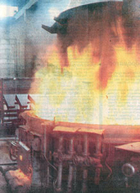 In
1989 the Greek Government burned 17 million police files from police
stations across the country. The files were classified as "The (Security)
Files" and covered police activities during the Greek Civil War. The
authors of this brilliant article say "the government decided not only
to abolish the ‘consequences' of the Civil War, but also to destroy
all evidence of the suffering of millions of people." The article, Renegotiations
of Twentieth-Century History: Access to ‘Sensitive' Government Records
and Archives in Greece, is by two historians, Maria Couroucli and Vangelis
Karamanolakis. The article is Here.
In
1989 the Greek Government burned 17 million police files from police
stations across the country. The files were classified as "The (Security)
Files" and covered police activities during the Greek Civil War. The
authors of this brilliant article say "the government decided not only
to abolish the ‘consequences' of the Civil War, but also to destroy
all evidence of the suffering of millions of people." The article, Renegotiations
of Twentieth-Century History: Access to ‘Sensitive' Government Records
and Archives in Greece, is by two historians, Maria Couroucli and Vangelis
Karamanolakis. The article is Here.
Macedonia & Its Questions
 The
book Macedonia and its Questions: Origins, Margins, Ruptures and Continuity
is a collection of 11 papers on Macedonian linguistics, political science,
sociology, history and law. The publisher, Peter Lang, says the book
challenges the idea that some nation-states and some ethnicities can
in some way constitute a "question" while others do not. The so called
"Macedonian Question" generally involves questioning the existence of
Macedonians and one of the aims of the book is to reframe the discussion
from the Macedonian perspective. The book is edited by Victor Friedman,
Goran Janev and George Vlahov. There is more information Here.
The
book Macedonia and its Questions: Origins, Margins, Ruptures and Continuity
is a collection of 11 papers on Macedonian linguistics, political science,
sociology, history and law. The publisher, Peter Lang, says the book
challenges the idea that some nation-states and some ethnicities can
in some way constitute a "question" while others do not. The so called
"Macedonian Question" generally involves questioning the existence of
Macedonians and one of the aims of the book is to reframe the discussion
from the Macedonian perspective. The book is edited by Victor Friedman,
Goran Janev and George Vlahov. There is more information Here.
Videos on Macedonian Questions About the Prespa Agreement  Independent
Journalist Silvana Pavlovska now has over 300 short videos in her YouTube
Channel. Many of these are on the Macedonian question and its current
Macedonian political issues. One series of commentaries is on The Prespa
Agreement as Cultural Genocide of the Macedonian National Identity.
This is based on the views of the well-known critic of the Prespa Agreement,
Professor Dr Igor Janev. A new series is on the book The Greek Anti
Macedonian Struggle Part I: From St. Ilija's Day to Zagorichani (1093-1908)
by Dimitris Lithoxou. The videos are in English. Ms Pavlovska is a Macedonian
language interpreter, translator and trainer and there are also videos
on these topics. Her YouTube Channel is Here.
Independent
Journalist Silvana Pavlovska now has over 300 short videos in her YouTube
Channel. Many of these are on the Macedonian question and its current
Macedonian political issues. One series of commentaries is on The Prespa
Agreement as Cultural Genocide of the Macedonian National Identity.
This is based on the views of the well-known critic of the Prespa Agreement,
Professor Dr Igor Janev. A new series is on the book The Greek Anti
Macedonian Struggle Part I: From St. Ilija's Day to Zagorichani (1093-1908)
by Dimitris Lithoxou. The videos are in English. Ms Pavlovska is a Macedonian
language interpreter, translator and trainer and there are also videos
on these topics. Her YouTube Channel is Here.
More Free Ebooks
There are now over 500 free ebooks in The
Pollitecon Free Ebooks Library.
Macedonia Needs Macedonians

Please remember that Macedonia Needs Macedonians. The Facebook page
for the Macedonia Needs Macedonians group is Here.
Two major tourism portals are Travel2Macedonia which is Here,
and Macedonia - Timeless which is Here.
Canadian Macedonian Books
 A
reminder that Canadian Macedonian Books has a great selection of Macedonian
books in English from around the world. These include non-fiction, fiction,
children's and cook books. Canadian Macedonian Books is run by Virginia
Evans, a former co-president of the Canadian Macedonian Historical Society
and founder of the Macedonian Film Festival in Toronto. Canadian Macedonian
Books is Here.
A
reminder that Canadian Macedonian Books has a great selection of Macedonian
books in English from around the world. These include non-fiction, fiction,
children's and cook books. Canadian Macedonian Books is run by Virginia
Evans, a former co-president of the Canadian Macedonian Historical Society
and founder of the Macedonian Film Festival in Toronto. Canadian Macedonian
Books is Here.
Sign
up to receive Pollitecon Updates
Thank you
Victor Bivell
Pollitecon Publications
PO Box 3411
Wareemba NSW 2046 Australia
Email vbivell @ pollitecon.com
Web http://www.pollitecon.com
More Updates

